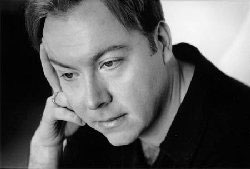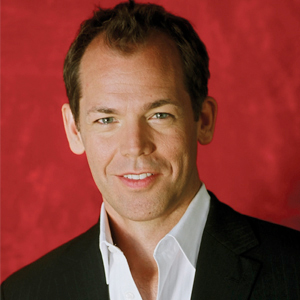by Jarrett Hoffman

“It gave me the freedom to put forward some works I might not otherwise have a chance to program,” Fitch said in a recent interview. Selections by Elliott Carter, Toru Takemitsu, and Frederick Fox came to mind — and to cap off the evening, the esteemed composer, who is head of CIM’s Composition department, looked to a new work in his own catalogue.
On Wednesday, February 7 at 8:00 pm in Mixon Hall, Fitch will lead the CIM New Music Ensemble in a free concert to include the director’s own The Range of Light. Joined by baritone Dean Southern, head of CIM’s Voice and Opera division, the Ensemble will give the 2017 work its second-ever performance.
Elliott Carter’s Sonata for Flute, Oboe, Cello, and Harpsichord will open the evening. “His music can be very challenging, even for the most experienced players,” Fitch said, “but this year’s ensemble is relishing the challenge, and I think it’s going to be a fantastic performance.”
Next comes one of Fitch’s favorite pieces: Toru Takemitsu’s Rain Spell for flute, clarinet, harp, piano, and vibraphone. “We played it a few years ago, and I wanted to bring it back. It’s a beautifully evocative piece, and I love his music.”
For the first-half finale, Fitch’s alliterative choice of Frederick Fox’s Upon the Reedy Stream comes with a couple of fun facts. Fitch studied with Fox at the Indiana University School of Music, now the Jacobs School of Music. “Fred was my primary teacher, so I always try to program a piece of his when I get the chance,” he said. And in 1991, Fitch himself conducted the premiere of this chamber work for oboe and string quartet. “A group of us who were studying with Fred put on a 60th-birthday concert for him, and it ended with this new piece of his.”
The second half of Wednesday’s concert will be devoted to Fitch’s The Range of Light, scored for baritone (Dean Southern, above) and a sextet of flute, clarinet, horn, violin, cello, and piano. At 25 minutes, its six movements include three for full ensemble and three focusing on subsets of the group. It was commissioned by the Rocky Ridge Music Center, where Fitch teaches in the summer, and was premiered there in July. The composer has since added a movement and made several tweaks. “This is the premiere of the revised, complete version of the piece,” he said.
Rocky Ridge Music Center’s summer home, the town of Estes Park, Colorado, is also the headquarters of Rocky Mountain National Park. For texts, Fitch turned to the “Father of the National Parks,” naturalist and author John Muir, borrowing from books such as Our National Parks, My First Summer in the Sierra, and The Yosemite. “Some of the texts are used directly as written by Muir,” Fitch said, “while others were rearranged to create a more musical flow or narrative structure.”
Does anything change when Fitch conducts the New Music Ensemble in one of his own works? “Not particularly,” he said. “I want the piece to go as well as I want the Carter, the Takemitsu, or Fred’s piece to go. I can separate my coach-conductor self from my composer self, so in many ways when I’m coaching a piece of my own, it’s the exact same way I would coach Stephen Hartke’s music: thinking about the composer’s intent, getting all the details right, etc.”
Fitch laughed, bringing up one possible difference when he coaches one of his own pieces. “There might be a moment where I say under my breath, ‘Oh my god, this part is terrible. Who wrote this?’ But the kids I’m working with at CIM are so responsive. Even if I need to change something in one of my own pieces during rehearsal — I would never change anything in my colleagues’ music — I can do that, and they’ll react immediately.”
Do the students feel any different rehearsing a work by their own conductor? “Well, it’s natural that they might feel a little bit more pressure because I’m in the room. But I think it’s more that they feel a heightened sense of responsibility. Some of them have been in the ensemble for a few years, and they may never have played a piece of mine, so this is their chance, and I think they want to get it right.”
Published on ClevelandClassical.com January 29, 2018.
Click here for a printable copy of this article




